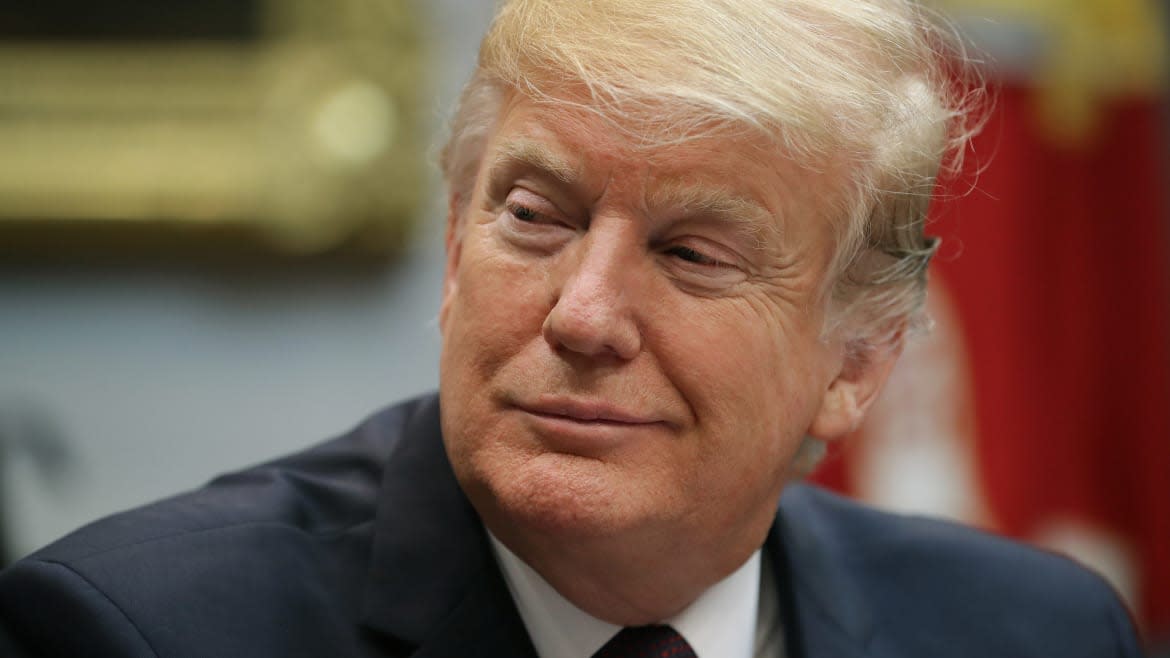Trump’s Political Future Hinges on How, Exactly, GOP Voters Want to Own the Libs

- Oops!Something went wrong.Please try again later.
- Oops!Something went wrong.Please try again later.
- Oops!Something went wrong.Please try again later.
Former President Donald Trump is running for president again, a near-inevitable development which nevertheless feels a bit surreal. In marked contrast to his last campaign, however, this time Trump’s viability within his own party is an open question.
Gone is the 2020 unity behind a sitting president, the willingness to do without a real primary race or party-sponsored debates or even a platform beyond whatever came out of Trump’s mouth. The New York Times’ Bret Stephens has declared Trump “finally finished,” while conservative writer Kevin Williamson, in the same pages, makes the case that the former president “remains the leader of the Republican Party” and “could win again.”
Either forecast could easily prove correct. Assuming some reasonably compelling challengers—say, Florida Gov. Ron DeSantis, as is widely anticipated—the question which will decide Trump’s fate in the GOP primaries is how, exactly, Republican voters want to own the libs.
Surprise! The GOP Has an Even Bigger Problem With Its Activist Base Than the Democrats.
Let’s set aside, for the sake of discussion, the institutional difficulties the GOP would have in moving on from Trump in a timely manner and focus on that voting base. We know negative partisanship is running high (as it is among Democrats), and victory is paramount. But within the base are two distinct and, at times, competing dynamics of how the libs should be owned.
One we might call the troll own.
The voters in this camp like Trump personally. Their affection for him is unique and probably not transferrable. They enjoy his showmanship, salesmanship, and comic timing. They think his slurs are sharp, his one-liners are funny, and his continued ability to send large swathes of the mainstream media into an emotional tizzy is hilarious. They are laughing at the New York Times’ black hole for your sad Trump feels at this very moment. It’s precisely the kind of “snowflake” reaction they love to see Trump induce in their political opponents. Victory, in this model, is performative and cultural. The libs are most owned when they scream in agonized frustration.
Donald Trump and Mike Pence Launch the Political Comebacks No One Wants
For 2024, Trump is still the obvious choice for voters who want the troll own. DeSantis—let alone former Vice President Mike Pence—is not as fascinating or funny as Trump. A President DeSantis would not reliably produce the same emotional highs a President Trump could give. He would be far less quotable, even with Trump’s nickname game in decline. Unless Fox News host Tucker Carlson unexpectedly joins the race, Trump is indisputably the best candidate for Republicans seeking a president who can make Democrats have another four-year meltdown.
The second camp is interested in a more transactional own.
They want a prize more substantive than feelings, more tangible than a laugh. They want to acquire and wield government power for specific ends. They have an actual policy agenda: maybe appointing judges, or banning critical race theory, or addressing inflation, or sticking it to Red China, or simply preventing Democratic trifecta governance and the policies that could bring.
The transactional voter may enjoy or deplore Trump’s offensive antics, but the antics are not a decisive factor—unless they become an impediment to accomplishing more practical goals of policy and power. Victory here is formal and legal. The libs are most owned when the expansive state apparatus they built is turned against them and the causes they hold dear.
For voters making this calculation, the case for Trump is weak and growing weaker. “Whatever purpose they believe he was meant to serve—bringing working-class voters back to the Republican fold; restoring nationalism to conservative ideology; rejecting the authority of supposed experts—has been served,” as Stephens argued. “Others can now do the same thing better, without the drama and divisiveness.” Trump might have once been useful, but a more disciplined standard-bearer could be more useful still. Take up the best tool at hand.
You’ll Be Just Fine if Twitter Dies
Which lib-owning dynamic will prevail in the 2024 primaries remains to be seen. The transactional model is clearly favored among the Republican elite, who are telling a story of Trump on the outs because he is costing the GOP elections.
See, for example, National Review’s new case against Trump’s candidacy, which casts him as a loser whose erratic behavior in office undermined Republican goals. Or see The American Conservative’s flagship blogger Rod Dreher, who declares himself “sick and tired of the Trump diehards who care more about indulging their obsession with Trump, and rolling in the psychodrama like swine in slop, than they do about winning actual elections and making changes in the world.”
But among the average Republican primary voter whose musings are not published in major outlets, the troll own is undoubtedly popular. Can a post-Trump politics entertain in the manner to which the base has become accustomed? Rolling in psychodrama is fun!
One prediction, however, seems sure: If Trump does snag another nomination, many—probably most—of the transactional faction will once again fall in line. (Dreher pledged as much just two paragraphs later.)
The pragmatic case against Trump will be twisted into an argument for striking the 2016 deal anew: Even poorly wielded power is better than no power at all.
Get the Daily Beast's biggest scoops and scandals delivered right to your inbox. Sign up now.
Stay informed and gain unlimited access to the Daily Beast's unmatched reporting. Subscribe now.

